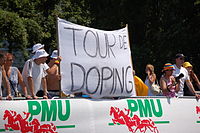To the casual observer, fighting drug abuse in cycling might seem a lost cause. This year’s Tour starts amid yet more scandals. Lance Armstrong, a seven-time Tour winner and still the world’s most famous cyclist, is facing a doping investigation by the US Food and Drug Administration, and has been denounced by several former teammates. Meanwhile Alberto Contador, winner of last year’s Tour and favourite for this year’s, is the subject of a legal battle over a positive drug test.If cycling is the most clean (oh really?), does that tell us how dirty the other endurance sports actually are?
Perhaps it’s inevitable in a sport that demands such super-human efforts that there will always be temptation. Speaking of which, would he like a pudding? Some dessert wine? Yes and yes – gooseberry crème brûlée and a glass of Sauternes for him, Eton Mess and Muscat for me. The car arrives to pick him up – it is 3.30pm – but he shoos it away, saying we need more time.
So is there any hope? What Millar says next is perhaps the most shocking thing about the entire story: “Today ours is the cleanest of all the endurance sports.” I almost choke on my meringue. Really? “You can go into the sport now as a young rider and never encounter doping, never see a syringe ... Of course we still have the anomalous cheaters you get in any walk of life but they are a minority – for a long time they were the majority.”
How has this come about? Is it the result of technological advances in testing or various campaigns by the World Anti-Doping Agency, on whose committee Millar sits? “To be brutally honest, it’s simple economics. If they want to come into cycling, sponsors need to know the team they are funding is clean, otherwise the risk is just too great.” For years, sponsors would come in for a few years, get burnt by a scandal and pull out. Today, at least three teams – Garmin Slipstream (which Millar played a key role in setting up), Sky and HTC Highroad – make being clean a key part of their image. They ensure their riders deliver on that promise by constant blood-profiling and by providing support for young riders.
In other news, the Biotechnology Industry Organization has encouraged its members to collaborate with WADA to develop doping tests for relevant drugs as those drugs are being developed. This would seem to be a prerequisite to any effective doping regime, else the testers will forever be steps behind the dopers.
GlaxoSmithKline has already announced that it will participate in the initiative:
GSK’s commitment to give Wada confidential information on medicines in early development is unusual in an industry that traditionally keeps its pipeline of future products as secret as regulations permit.As the arms race continues, does governance stand a chance?
Pauline Williams, who is managing GSK’s anti-doping initiative, told the Bio meeting: “What a great opportunity this is for pharma to do something pro-active on a voluntary basis – recognising a risk and doing something about it, rather than waiting for regulations.”
Respiratory medicine is one area of expertise within GSK likely to be of interest to Wada. Sports cheats are interested in inhaled drugs and greater lung function.
A specific GSK compound in development – a potential treatment for anaemia associated with chronic kidney disease and arterial disease – may be a tempting target for dopers. This “prolyl hydroxylase inhibitor” mimics body responses to low levels of oxygen and stimulates red blood cell production. The drug’s effects are similar to those of erythropoietin or EPO, which has presented great problems for Wada.
The industry’s decision to move against doping does not just reflect corporate altruism. Drugs’ reputation can be undermined by negative coverage if their abuse is frequently in the news, said Olivier Rabin, science director of Wada. “Some patients are concerned about taking EPOs because of the bad publicity.”
Mr Rabin said that, while “eradication of doping in sport remains a distant dream”, he was becoming more optimistic. “Many athletes are telling us their sport is cleaner than ever,” he told the FT. “Now that the industry is joining us, we have a better chance.” Steve Elliott, science director of Amgen, the US biotech company, argued industry attitudes still need to change. “Sports doping is such an alien concept in the industry,” he said. “The attitude is it is not on our radar and we don’t have to think about it.”
For all the moral pressure to keep clean and avoid doping, the biggest disincentive against cheating is fear of getting caught – and that means developing a way for authorities to detect a drug in samples before it becomes available illegally to athletes. “An effective test does more than anything else to stop abuse,” said Dr Elliott.

0 comments:
Post a Comment